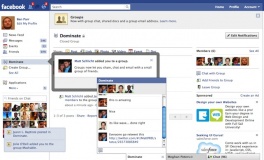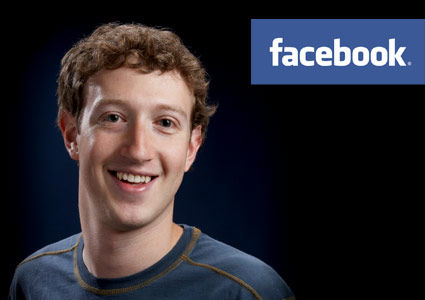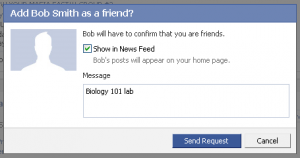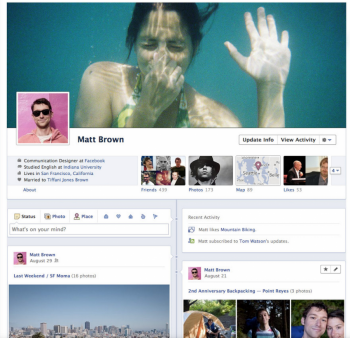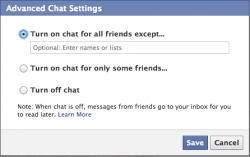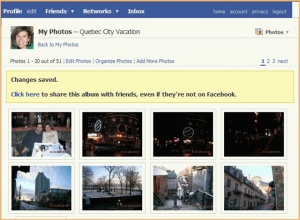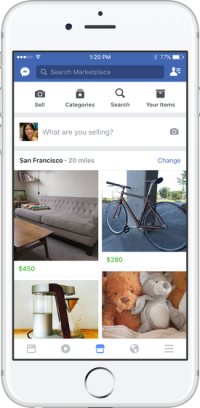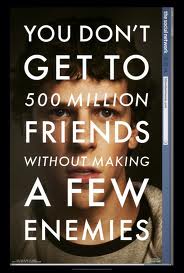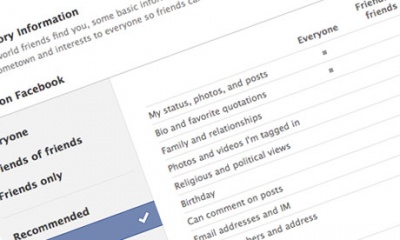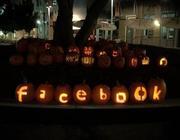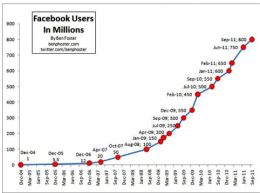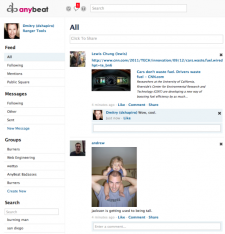| Community | Anyone who creates an account |
| Membership | open, free, registered |
| Privacy | features that support privacy |
| Self Identity | Profile, Photos, Friends, "Likes" |
| Features | Sharing Photos, Online Chat, Wall |
| Status | |
| Launch Date | February 4, 2004 |
| Users | 1 billion |
Facebook is a social-networking site, founded by Mark Zuckerberg at Harvard University in 2004. The first version was developed in Zuckerberg's dorm room, and it has since become one of the most frequently visited websites in history; Facebook has over 1 billion active users.[1] Facebook grants users the ability to communicate with friends by sharing links, images, videos and text information associated with their personal identity. The site also allows users to interact with posted content by "liking" it or leaving comments. Facebook has changed both its appearance and its functionality numerous times, each change being met with a certain amount of discontentment and backlash from the user-base. The history of the development of Facebook has an effect that reaches beyond social media in the film The Social Network. The site also poses serious ethical questions regarding the privacy of users and the ownership of their information posted. There has also been some criticism concerning addiction to Facebook.
Contents
- 1 History
- 2 Facebook Features
- 2.1 Friending
- 2.2 About
- 2.3 Wall
- 2.4 Timeline
- 2.5 Chat
- 2.6 Messaging
- 2.7 Comments and Liking
- 2.8 Tagging
- 2.9 Poking
- 2.10 Groups
- 2.11 Friend Lists
- 2.12 News Feed
- 2.13 Status Updates
- 2.14 Photos
- 2.15 Like Pages
- 2.16 Gifts
- 2.17 Marketplace
- 2.18 Frictionless Sharing
- 2.19 Notifications
- 2.20 Applications
- 2.21 Live
- 2.22 Third Party Applications
- 3 Cultural Influence
- 4 Ethical Concerns of Facebook
- 4.1 Privacy
- 4.2 Location Services
- 4.3 Messenger
- 4.4 Hacking
- 4.5 Cyberbullying
- 4.6 Illegal Commerce and Fraud
- 4.7 Data Mining and Transparency
- 4.8 Third-Party Applications and Data Sharing
- 4.9 Facebook Advertising
- 4.10 Federal Trade Commission
- 4.11 Europe Versus Facebook
- 4.12 Identity Issues
- 4.13 Secret Mood Experiment
- 4.14 Ownership of Information
- 4.15 Facebook versus Offline Interaction
- 4.16 Inappropriate Content
- 5 Facebook Usage
- 6 Criticisms
- 7 Competitors
- 8 See Also
- 9 References
- 10 External Links
History
Harvard
Mark Zuckerberg developed a site called "Facemash" while he was an undergraduate at Harvard. The site displayed four photos of Harvard University students, two males and two females, and prompted the user to vote on who was "hotter".[2] The popularity of this site inspired Zuckerberg to create another social website called thefacebook.com. It launched in February of 2004 and was exclusively for Harvard students. The website immediately became popular, with almost half of Harvard students registering for the site within its first active month.
Despite the site's immediate success, Zuckerberg still had issues to deal with concerning the creation and inspiration of thefacebook.com. After the site launched, three other Harvard students, Cameron Winklevoss, Tyler Winklevoss, and Divya Narendra, accused Zuckerberg of misleading them, as he had agreed to help build them a similar website, "Harvard Connection". This, along with the influence of the film, The Social Network, lead the Winklevoss twins to pursue a lawsuit claiming that Zuckerberg stole their idea to create Facebook. In 2008, the Winklevoss twins decided to end their lawsuit and accepted a $65 million settlement, composed of $20 million cash and a share of Facebook stock worth $45 million at the time. The twins' stock is now estimated to be worth over $150 million.[3]
Expansion
One month after thefacebook.com was launched at Harvard, Zuckerberg expanded registration to Columbia University, Yale University, and Stanford University. Shortly after these universities were added, registration began to open for other colleges and universities. In 2005 Zuckerberg dropped "the" from the name, and in September 2005 registration became open to all high school students, although it required an invitation to join. Facebook kept expanding until September 2006, when it was opened to anyone over the age of thirteen with a valid email address.
- Acquisition of Instagram: In its largest acquisition yet, Facebook made an offer of about $1 billion in cash and stock to purchase Instagram (with all 13 employees) in April 2012, a month before Facebook was going public. The plans intended to keep the company independently managed as many were concerned their photo-sharing capabilities on Instagram would be thwarted by Facebook. The Office of Fair Trading approved of the deal on August 14, 2012, and on August 22, 2012, the Federal Trade Commission in the United States closed its investigation.[4] From there the deal proceeded and on September 6, 2012, the deal between Instagram and Facebook officially closed. Instagram is now currently operating under the ownership of Facebook.[5]
Initial Public Offering
Facebook received its IPO (Initial Public Offering) on May 18, 2012. This was one of the largest IPOs in history, capitalized at over $104 billion, with an opening price of $38.00 a share. By Friday October 26, 2012 this price had dropped to $21.94 a share.[6]
Facebook Features
Through their profiles, Facebook users are able to share their photos, interests, and personal information with their social network. Users are able to communicate with each other by posting publicly on the timelines of Facebook friends, sending private messages to other users and chatting with their through Facebook chat or messages in both text and video.
Friending
Friending is an act of connecting with someone through Facebook. Users can either find people to connect with by searching for a name or email address, by being recommended by other friends, or by having Facebook suggest friends for them. After a user is sent a friend request, the user can choose to accept or deny this request, or simply just leave the invitation pending with no action required. Users are also given the option to sort their friends into categories, such as "family", "co-workers", "housemates", etc. If a user later decides they no longer want to be friends with someone, they have the option of un-friending them. Users may also block their friends from viewing their profile or being able to look them up. There is also a newer feature to mark friends with a gold star. The gold star identifies certain friends as "close friends," causing all of their recent activity to show up at the top of a user's news feed. Any action of a "close friend" will also warrant a notification on a user's home page, thereby keeping him or her up-to-date on their close friends' activity.
Friends can also be labeled as "acquaintances"[7]. These people will rarely show in a user's Newsfeed, and they can also be easily excluded if the user should want to disallow people from viewing their pictures or posts; all acquaintances are compiled on one list, so users can exclude them all together at once instead of having to select each and every person to exclude.
About
All Facebook profiles have an about section where users are able to display their employment, education, relationship status, contact info, family, and living location. Originally this section was the main part of a user's profile, but with the introduction of the wall and then the timeline interface, this has become a secondary page that requires a click through on the user's profile. Interests, favorite music, favorite films and other information used to be displayed on the about me section. However, with the introduction of pages, users now like pages to indicate their tastes and preferences.
Wall
The main page of a user's profile is called the Wall. This is where anything the user posts (links, photos, status updates, etc.) is shown. Other users may also post public messages on a friend's Wall. The message can be text, a photo, a video, or a link, and is visible to anyone who is friends with the user on whose wall it is being posted on. The user can also limit visibility of the post to certain users by selecting the optimal security settings within the posting area before posting. The user may choose to hide certain stories or categories of stories from others of their choosing or disable the wall feature all together, so no one is able to write on their wall. In this case, only their own actions will be displayed on their wall. Users can also choose the ability to comment or "like" posts that are found on their friends' Facebook Walls. Recently, the Facebook wall was changed into a timeline.
Timeline
The Facebook Timeline is a drastic redesign of the previous Facebook wall. The beta version of this feature was available as early as September of 2011, where users had to become a developer of Facebook to gain access to the Timeline feature. Additionally, only users that had Timeline were able to view other users profiles that were in Timeline. In December 2011, Facebook began to roll out Timeline to the general public. Timeline turns a user's wall into a virtual scrapbook. It keeps track of all the user's activity on Facebook and organizes them in chronological order, by year and then by month. Instead of a having events arranged in a single column, events are arranged in two columns, with the option to highlight certain posts. When Facebook users visit a friend's Timeline, Facebook will automatically highlight specific aspects of that person's life. Individual users are also able to edit which specific events they want to highlight in their life. Featured items are expanded to span the entire width of the Timeline. Additionally, users have the ability to add previous events to their Timeline, such as births, vacations, learning new skills, and other significant events. Many people are concerned about this new feature because of the inherent privacy issues it creates. Additionally, Facebook users have historically been resistant to changes to the basic layout of the Facebook profile.
Another major change to Facebook with the creation of Timeline is the larger integration of visual media into the Facebook profile and an inclusion of an Intro section. Instead of only a profile picture, Timeline incorporates a cover photo. The cover photo is a larger photo that is at the top of a person's Timeline. The Intro section allows users to provide a description of who you are, link information about yourself to your Timeline such as when you joined, relationship status, and education, and add up to five featured photos to display. The Intro section sits on the left column, displayed next to the status updates. With the change to Timeline, although there is also less personal information displayed on a user's page, it easier to find old posts because of the toolbar on the side of the Timeline which allows users to jump back to a specific year or month.
Chat
Facebook chat is similar to other instant messaging platforms, such as AOL AIM, MSN Messenger, and Google Talk. Users are able to chat one-on-one with others, or form chat groups with multiple users. There are also mobile applications that allow Facebook to forward messages to users' mobile devices, even if they are not logged into Facebook. Even without a mobile application, chat messages can be sent to an offline user; they will simply be sent to the user's inbox. Recently, Facebook partnered with the video-chat service Skype to allow users to video chat through Facebook. Facebook chat has improved over time. Initially, it experienced common freezes and didn't save past conversations so that users could refer back to them. After initiating the feature of messaging an offline user and storing that message in their inbox, it has increased in popularity. One feature Facebook Chat included was the functionality that someone is notified when their message has been seen by the other person. This feature has some ethical concerns because it potentially violates someone's privacy. While it may be useful information for the sender of the message so that they have a confirmation that their message has been seen, the receiver may want more time to respond to the message without the other person knowing how much time they are spending to respond. Facebook chat also has settings to turn chat on or off, and even display on or off for a selective group or individuals. This gives users control over who can and cannot see their online status, allowing selective privacy.
Messaging
Facebook allows its users to send private messages to each other through an inbox function. This is similar to the chat application, except the message appears in an inbox rather than a chat window. As with Facebook chat, users can also send group messages. Messages are sent privately, and are only able to be viewed by those to whom they are sent. It is also possible for users to send messages to those they aren't friends with, as long as the person's privacy settings are set to allow messages from non-friends. Similar to chat, Facebook inbox also includes a "seen" feature so the that sender knows when the recipient has viewed their message. Users can also attach files and pictures to messages.
Comments and Liking
Users can comment on statuses, photos, videos, and many other things shared on the site. Users can also "like" elements on the site as a form of commenting. During 2016 Facebook also integrated the feature of liking with a new feature that allows you to react to a person's post. Facebook users now have the chance to capability their emotions with five additional emojis — “love,” “haha,” “wow,” “sad” and “angry”— that have been linked to the “like” button.[8] Facebook allows users to add or remove their own comments, providing the option to also remove comments other users post on their own timeline, so they will no longer be visible to others visiting their page. There is also the option to report comments or posts as abusive, as spam, or to block a user or give them user feedback. This gives the user control to keep their page clear of content they don't prefer.
Facebook has also introduced the functionality of editing comments, marked by a pen icon in the corner of their comment. A user can either delete the comment altogether and possibly rewrite a new comment or they can edit their existing comment. If a comment is edited, other users can see that the comment was edited and are also able to view the previous edits. The ability for users to view previous edits perhaps creates a privacy concern, as it defeats the purpose of modifying comments one does not want others to see.
Tagging
Users have the ability to tag their Facebook friends in status updates, wall posts and other posts. When tagging was first introduced, users had to include the "@" character before the friend's name, but now it is possible to tag someone simply by typing their name. When this occurs, Facebook will recognize the name typed and a drop down menu will appear with the list friends that matches the typed name. At this point, tagging is optional to users; it is not compulsory. Tagging is often used to notify a specific friend that something is posted. The tags are not permanent; users have the ability to "untag" themselves if they do not want to be associated with the post. However, their name or post will still be active on Facebook.
Poking
Facebook also allows its users to "poke" other users. When poked, users are given the option to poke back, hide the poke, or to simply ignore the poke. But once a user has poked someone, they cannot poke them again until the person being poked takes action on that poke. This prevents people from poking someone an infinite number of times. Zuckerberg describes the poke function broadly: "When we created the poke, we thought it would be cool to have a feature without any specific purpose. People interpret the poke in many different ways, and we encourage you to come up with your own meanings".[9] Some users can engage in what they call "poke wars" and poke each other until one user decides to stop.
Groups
Facebook allows its users to form groups in which comments, messages, links, videos, and photos can be posted. Privacy settings allow users to control which people have access to the group and which people are able to post to the group. Users can belong to up to 300 different groups. People use groups for school clubs, groups of friends, family groups, class projects, and other communities. Recently, Facebook paired up with Dropbox in order to enable easy file sharing. Users are able to directly link files from their own Dropbox, and if those files are edited, the host file is edited, too.[10]
Friend Lists
The "Friend Lists" feature on Facebook allows users to share with a specific audience. Users can utilize this feature to filter the content shown on their News feed or to post content to a specific group of people on Facebook. Facebook has four categories for lists:
- Close Friends: People you may want to share exclusively with
- Acquaintances: People you might want to share less with
- Restricted: People you do not want to share content with
- Custom: User-specified privacy settings
People are not notified when they are added into lists by other users but those who are able to see the post can also see the audience that the post is being shared with. Utilizing the "Friend Lists" feature is a great way for users to organize their friends on Facebook. [11]
News Feed
The news feed appears on the homepage of Facebook after the user logs in. It contains a constant up-to-date thread of the user's Facebook 'friends' recent activity. The news feed also contains upcoming events, friends' birthdays, and changes to users' profiles. A recent update allows users to swap between top stories and recent stories. Recent stories shows a chronological list of a user's friends' actions, while top stories shows the most popular stories based on the number of comments and likes. Users are also able to mark or un-mark stories as being top stories. They also have the option to select how many updates they would like to see in their news feed from certain users. Users can also choose to stop receiving notifications from users all together, regardless of whether they remain friends on the site.
Status Updates
A status update is a message composed by a Facebook user that gets posted on the user's timeline and that may appear in their friends' news feeds. The original use of status updates was to inform people of what a user was doing or feeling at a particular time. However, status updates have evolved to be more broad. Originally, status updates would read: "[user name] is ___", but as they have evolved, the "is" was dropped, allowing the user to speak in the first person.
Photos
Facebook is currently the largest online photo hosting website. It allows its users to upload photos and create photo albums that can be viewed on their profile. Users can tag friends in their photos so that they will also appear on the tagged users' profiles. Photos can also be shared on other users' profiles, even if they themselves are not in the photo. If a user is unhappy with a photo, they can untag themselves from the picture. With the Timeline feature, users can opt to "hide" their tags on photos as an alternative to untagging. With this feature, the photo is removed from the user's profile, but their name is still included under "tags" for those who view it on another person's profile or in an album.Like Pages
Like Pages on Facebook include topics of interest, places, people, and ideas. When a user likes a page, they become a fan of that page. Owners of Like Pages are able to access information about their fan base, similar to Google Analytics. Like Pages can have an infinite number of fans, whereas a single user's profile can only have 5,000 friends. Users' liked pages will show up in their profile under interests. Like Pages are also now known as "Fan Pages", and are used by many companies as a method of advertising. Studies have shown that people who like a corporation on Facebook are more likely to purchase their products. Companies like Delta and Victoria's Secret even provide a feature to purchase gift cards or book flights through their Facebook page. They also let people share their purchases with their friends, which can also help companies gain more business.[12] Like Pages also have the ability to host event and upload photo albums. In late 2012, Facebook added a new feature for Pages. It recommends to users what Pages they might be interested in. This is separated from one's "Pages Feed."
Gifts
Facebook has recently rolled out Facebook Gifts[13] to everyone in the U.S., where users can now purchase virtual and physical gifts for one another by simply clicking on a "Gifts" tab, located on the top-right corner of one's timeline. Users can buy gifts from various retailers, with products ranging from giftcards, to food, wine, and more. This move will most likely bring in additional revenue and is a large step in expanding Facebook into a more profitable venue, in addition to the advertisements, as Facebook will take a percentage of earnings. These purchases will be made publicly and will be interesting how Facebook will data mine Gift purchases and affect social pressures to return the favor or purchase gifts along with birthday wishes. [14]
Marketplace
In the fall of 2016, Facebook relaunched “Marketplace” due to the success of selling groups on Facebook. Originally having been launched in 2007, it was met with little success and shut down in 2014.[15], However with the increased usage of the “buy and sell” groups on Facebook (estimated to have up to 450 million visitors), the company reconsidered the Marketplace feature and it’s possible success.. On October 3rd, 2016 however Marketplace was reintroduced as a “ convenient destination to discover, buy and sell items with people in your community.” Facebook intends to surpass Craigslist as the largest peer-to-peer selling platform available online. The success behind Marketplace is based off of the credibility behind the postings, since a Facebook profile is required in order to make a posting, the consumer will have access to the seller’s profile, making transactions safer. With the element of a social media presence, there is more hesitation for scammers to participate in fraudulent activity. The Marketplace feature also places emphasis on the convenience of its usage, since users no longer need to go on external sites such as Craigslist to find and or sell goods. Buyers and sellers can chat on Messenger without compromising personal information like phone numbers or email addresses. Facebook’s text analysis A.I. has premade messages like “Is this item still available” or “what condition is this item in?” make transactions and negotiations. simpler.[16] The Marketplace feature can also utilize the users location to show the consumer items to buy from people who live nearby.
Frictionless Sharing
Frictionless sharing integrates third-party products with Facebook and shares information between them. For example, connecting Spotify to Facebook allows users to see their Facebook friends' playlists within Spotify, in addition to allowing users to post what songs they are listening to. Most of the terms of use of these applications require that they can then post to Facebook on one's behalf, advertising their application or posting one's activity using their application. The ability of for these applications to do so is a potential privacy concern, especially when the application's terms of use or misleading or the user is ignorant of the actions it will take on their Facebook profile. In December 2011, along with Timeline, frictionless sharing was introduced.[17] Critics of this feature claim that Facebook does not give users enough control when deciding how they'd prefer to use frictionless sharing.
Notifications
Facebook users can access their notifications from a button in the upper left hand corner of the page. Users are notified whenever there is new activity concerning them on Facebook, such as someone accepting a friend request, being invited to an event, someone posting to their wall or a group they belong to, being tagged, or someone commenting on something they have posted. Users are able to select what type of notifications they wish to receive and can opt for notifications to be sent to their email account or mobile phone.
Applications
Facebook developed applications include: Events, Photos, Videos, Notes, and Places. The events application allows users to create events, customize the descriptions and associated photos, and invite friends. The Photos and Videos applications allow users to upload their photos or videos for other users to see, comment on, and like. The Notes application is similar to a blog, where users can post notes for their friends to see. Notes are usually of a more personal and reflective nature than status updates or wall posts. The Places application allows users to check-in at locations, and has become more popular as the mobile Facebook application has taken off.[9]
Live
Facebook first introduced live streaming in August of 2015. Originally, live streaming features were only available to select, verified users. Users could tune into these live streams, watch as things unfold, and comment in live time. After streams were completed, they would be saved on the streamer's profile as replay-able videos [18].
On April 6, 2016, Facebook released the live-streaming feature called "Facebook Live" to all users. In a public announcement, Facebook CEO Mark Zuckerberg stated "Live is like having a TV camera in your pocket. Anyone with a phone now has the power to broadcast to anyone in the world. When you interact live, you feel connected in a more personal way."[19] Facebook invested $50 million in paying "influencers, publishers, and celebrities" to use and promote over Facebook Live. Relative to other videos on Facebook, Live has proven to be very successful, with users viewing live streams three times longer than the normal video[20].
Third Party Applications
Third party applications can be developed and added to Facebook. Many of these integrate one's actions on other platforms to Facebook, such as allowing Spotify to post what one is listening to as a Facebook status. There are also independent games, many of which are produced and developed by Zynga. These games can create entire other communities within Facebook, such as playing Farmville with certain friends.
Cultural Influence
The Social Network (Film)
On October 1st, 2010 the movie The Social Network, directed by David Fincher and starring Jesse Eisenberg as Mark Zuckerberg, was released.
The film follows the beginnings of Facebook and the legal disputes that occurred because of the site. Beginning in Zuckerberg's Harvard dorm room, the Social Network follows Zuckerberg as he pieces together the technical and logistical components behind his social networking site. As Zuckerberg develops the platform; expanding on his original idea and "borrowing" a similar networking site plan from the Winklevoss twins, before setting up the official business on the West Coast. As Zuckerberg meets Sean Parker, Napster's founder, he becomes alienated from his friends and later finds himself in multiple lawsuits.
The cast includes: Jesse Eisenberg (as Mark Zuckerberg), Andrew Garfield (as Eduardo Saverin) and Justin Timberlake (as Sean Parker).[21]
The film was a blockbuster success, raising over 224,920,315 USD at the box office. The Social Network also won several awards, including Oscars for Best Achievement in Film Editing, Best Achievement in Music Written for a Motion Picture, and Best Writing for an Adapted Screenplay.[22] The movie was based on the book Accidental Billionaires, by Ben Mezrich, and although no one involved in the development of Facebook was consulted on the script and production of the movie, Eduardo Saverin was a consultant for Mezrich's book.
Societal Effects
Zuckerberg has stated that he has received many messages from people who have been inspired to take a greater interest in computer science, or to start their own companies after seeing the film. Although, when asked about the film, Zuckerberg referenced Facebook's plans for the future, somewhat diminishing the significance the film has had. "We build products that 500 million people see... If 5 million people see a movie, it doesn't really matter that much." said Zuckerberg.[23]
Ethical Concerns of Facebook
Privacy
There are many privacy concerns surrounding Facebook. For example, people have argued that the safety of the user accounts is frequently compromised. Additionally, Facebook has faced lawsuits over source code and intellectual property.
In July 2011, German authorities began to discuss the prohibition of events organized on Facebook. This decision was based on several cases of overcrowding due to people who were not directly invited finding out about events on Facebook. In one instance, after reports of overcrowding, more than a hundred police were deployed for crowd control, where a police officer was injured and eleven participants were arrested for assault.[7]
Facebook also has certain privacy controls that permit anonymity.
These include but are not limited to:
- Users can control who can see certain aspects of their profile
- Users can control which of their photos are visible to others
- Users have the ability to de-tag photos
- Users can control who is allowed to comment on and like things they post
- Users can control which of their stories get published to the newsfeed
- Users have the ability to delete posts from their profile
- Users have the ability to appear as "offline" on Facebook chad
- Users have the ability to be unsearchable on Facebook
Settings and features change frequently, often on a weekly basis, but users are not always aware of the changes and some remain ignorant to control how much information they share via their Facebook profile. Because users “trust” Facebook, they share an abundance of information about themselves on the site. The security of our attributes can depend on who is asking for the information - if someone of authority requests our information, odds are those possessing it will share it regardless of insinuated privacy. Therefore, the more outlets Facebook creates for users to use and provide their information, the more information users will share and the more their privacy is threatened.[24]
Location Services
Facebook as well as many of its third party applications take advantage of the location service technology built into many modern devices. Today, location tags are added to all messages sent by a user unless they opt out of the service. Once this service is turned on for a user account, a notification appears on the user's screen for a few seconds but then disappears, never to resurface. Many Facebook users are skeptical of the site accessing their location data and disable it. However, this prevents certain features from being accessed on the site, such as "Checking In." Also, with the service turned on, Facebook discretely tracks users' locations and notifies them when their friends are nearby or have checked into places near them in the past. Last year, Facebook introduced a photo location feature, which displays dots on a map where the user's uploaded photos were taken.[25]
Messenger
In 2014, Facebook announced that it would be removing Facebook chat from its popular Facebook mobile application, replacing the chat function with a separate Messenger application.[26] Facebook as a network mainly facilitates interaction and connections with friends one has previously made offline, so when individuals send messages on Facebook there is a desire for their digital self to be an accurate (if not better) representation of themselves in real life. This may increase one’s desire to share more information about themselves on the Facebook Messenger app so that they are maintaining a positive social identity from the parts of their digital dossier represented from this account.[27]
Hacking
Facebook claims that computer hackers attempt to break into at least 6,000,000 Facebook accounts using stolen username and password details every day. People attempt to crack the accounts to steal user information, spread frauds or send bogus offers and messages trying to sell counterfeit goods to members' friends. Facebook has approximately 800 million users and receive over a billion login attempts each day. To combat this, Facebook has issued a security announcement promoting its new "Trusted Friends" password restoration technique. Many of the hackers are stopped by additional authentication questions, such as asking users to identify friends in pictures, but many attempts are still successful. "Trusted Friends" also allows a user to nominate three to five people to be sent login codes if a hacker breaks into their account and changes their password details.[28]
Glenn Steven Mangham
In December 2011, Glenn Steven Mangham, 26, a British student, pleaded guilty to charges that he breached security at Facebook, despite arguing that his intentions were not malicious. Mangham attempted to bypass security on the company's internal systems, causing alarm among the FBI that industrial espionage was occurring. Mangham had previously been rewarded by Yahoo for finding vulnerabilities in its systems. Mangham was arrested by the Metropolitan Police Central e-Crime Unit in June when Facebook found evidence that pointed to him. Mangham was accused of using a computer program to secure unauthorized access to Facebook and attempting to hack into Facebook's Mailman server, which is used to run internal and external email lists. Additionally, he attempted to secure access to server used by internal developers, Facebook Phabricator. Southwark Crown Court was told that Mangham produced software scripts that could hack into Facebook's Phabricator server to download "highly sensitive intellectual property." The student was also accused of breaching a web server used by Facebook to set software development puzzles to programmers who might be interested in working for the company.
Mangham's defense team argued that he was an "ethical" or "white-hat" hacker, whose intentions were only to uncover security vulnerabilities at Facebook with the intention of getting them fixed, and were not malicious. Mangham's attack did not involve an attempt to compromise or access user data.
Mangham is scheduled to be sentenced on February 17, 2012. [29].
Hacktober
Facebook recently celebrated its second-annual "Hacktober," a month-long event in October which features a series of simulated security threats attacking staffer computers to see who would fall for them and who would report the issues. If employees reported a phishing scam or security threat developed by Facebook, which showed up throughout the site or sent to company email addresses, they received a prize such as a Facebook-branded shirt, bandana or sticker. If the security threat went unreported or was clicked, staffers would undergo further training. Hacktober was also a part of a greater effort to celebrate October as National Cyber Security Awareness month. Threats, which were designed by Facebook's engineering team, were issued to groups within the company based on what they might encounter while doing their job. Each hack was explained afterward to reveal what happened and how employees could prevent similar incidents from spreading in the future. For example, Facebook developed a worm in the form of a fake Facebook news story that demonstrated how quickly spam can spread across the site. At the end of the month, Facebook treated workers to a Hacktober-themed Happy Hour and a pumpkin carving. [30].
Cyberbullying
Social networking sites such as Facebook allow people to keep in touch through the Internet. Facebook demographics show that around 10%, or 40 million Facebook users are teenagers, where Facebook is an extension of their school life, without being governed by rules that exist at school. Because of this, cyberbullying is a huge problem. A poll conducted in 24 countries found that one in ten parents online around the world say that their child has experience cyberbullying, and one in four of those parents say they know a child in their community who has experienced cyberbullying and of those, 60% say the children experienced the harassing behavior on social networking sites like Facebook. A Consumer Reports survey conducted in early 2011 in the US revealed that one million children were harassed, threatened, or subjected to other forms of cyberbulling just on Facebook over the past year.[31] Cyberbullying on social networking sites have lead to children and others hurting themselves or others.
Illegal Commerce and Fraud
With the launch of Marketplace, there is an increased potential for fraud. While Facebook itself does not process payments themselves, it serves as a conduit between the seller and buyer. However, early use of this feature has aroused concerns over the safety of transactions for both sellers and buyers. Another concern is the regulation of products sold on the site. The network maintains oversight over goods being sold on the site but illegal products have appeared on a regular basis.
Facebook’s Commerce Policy prohibits the sale of the following:
- Illegal, prescription or recreational drugs;
- Tobacco items and related paraphernalia;
- Unsafe supplements;
- Weapons, ammunition or explosives;
- Animals;
- Adult items or services;
- Alcohol;
- Adult health items;
- Real money gambling services;
- Goods, items or posts that we determine may be or are fraudulent, misleading, deceptive or offensive;
- Items or products with overtly sexualized positioning;
- Non-physical items are prohibited on Facebook Marketplace, including but not limited to services, subscriptions, digital products, or rentals.
Data Mining and Transparency
It is unclear what information Facebook collects from their users and what they do with this information, though many users have noticed personalized adds on the site. It is also unclear with whom Facebook is sharing the information they gather. Facebook does not notify the user when their data is collected or used with third-parties because Facebook has the right to the information on the site. Many websites are also moving towards a log-in and commenting systems that utilize Facebook. While these pages are designed for easy user access, they also allow websites and companies to engage in data mining without consent from the user. If Facebook users have lenient privacy settings, it would be easy for external websites to gather information about these users. Recently, Facebook adopted a new system of data deletion known as "archiving." Whereas in the past users could delete messages, for example, they are now only presented with the option to "archive" them. It is unclear what exactly happens to archived information and if it every truly gets deleted from the site.
Third-Party Applications and Data Sharing
Third-party applications are not allowed to sell the personal information they collect. Facebook’s Special Provisions Applicable to Developers/Operators of Applications and Websites clause states: “You [third-party applications] will not sell user data”.[32] However, the top ten third-party applications on Facebook disregarded this clause in 2010 and were caught selling personal information to data brokers by the Wall Street Journal.[33] The top three applications at that time were FarmVille with 59 million users, Phrases with 42 million users, and Texas HoldEm Poker with 36 million users.[34] From these top three applications alone, a minimum of 36 million users’ information was sold to at least 25 advertising and data firms.[33]
Facebook Advertising
Facebook has worked in conjunction with Datalogix, a data-mining company that collects sales information from physical retail stores. In order to demonstrate the effectiveness of targeted advertising, Facebook asked specific advertisers to show advertisements to targeted groups of people, and Datalogix verified whether or not users in this targeted group purchased the product. Of the 50 different advertisements Facebook tested, roughly 70% of the time, every dollar spent on advertising resulted in three dollars in sales.[33] Although this data illustrates the effectiveness of targeted advertising, Facebook’s willingness to hand over user information to Datalogix and advertising companies is still unsettling for many users.
Federal Trade Commission
On November 29, 2011, Facebook and the Federal Trade Commission came to an agreement regarding the protocol of protecting users' rights to privacy. The settlement addressed concerns that Facebook was not upholding "the promises about privacy that it makes to its hundreds of millions of users".[35]
- Complaints
- In December 2009, Facebook changed its website so certain information that users may have designated as private – such as their Friends List – was made public. They didn't warn users that this change was coming, or get their approval in advance.
- Facebook represented that third-party apps that users' installed would have access only to user information that they needed to operate. In fact, the apps could access nearly all of users' personal data – data the apps didn't need.
- Facebook told users they could restrict sharing of data to limited audiences – for example with "Friends Only." In fact, selecting "Friends Only" did not prevent their information from being shared with third-party applications their friends used.
- Facebook had a "Verified Apps" program & claimed it certified the security of participating apps. It didn't.
- Facebook promised users that it would not share their personal information with advertisers. It did.
- Facebook claimed that when users deactivated or deleted their accounts, their photos and videos would be inaccessible. But Facebook allowed access to the content, even after users had deactivated or deleted their accounts.
- Facebook claimed that it complied with the U.S.- EU Safe Harbor Framework that governs data transfer between the U.S. and the European Union. It didn't.
The proposed settlement bars Facebook from making any further deceptive privacy claims, requires that the company get consumers' approval before it changes the way it shares their data, and requires that it obtain periodic assessments of its privacy practices by independent, third-party auditors for the next 20 years.
- Settlement
- Specifically, under the proposed settlement, Facebook is:
- barred from making misrepresentations about the privacy or security of consumers' personal information;
- required to obtain consumers' affirmative express consent before enacting changes that override their privacy preferences;
- required to prevent anyone from accessing a user's material more than 30 days after the user has deleted his or her account;
- required to establish and maintain a comprehensive privacy program designed to address privacy risks associated with the development and management of new and existing products and services, and to protect the privacy and confidentiality of consumers' information; and
- required, within 180 days, and every two years after that for the next 20 years, to obtain independent, third-party audits certifying that it has a privacy program in place that meets or exceeds the requirements of the FTC order, and to ensure that the privacy of consumers' information is protected.
Europe Versus Facebook
Due to a European Union law requiring that companies allow people to request to see personal information that the company has collected, Max Schrems, a 24 year old law student in Vienna, received a personalized CD with information that Facebook has collected about him.[36] This CD contained over 1200 pages of data. Schrems claims, “No KGB or CIA ever had 1200 pages about an average citizen”. Furthermore, on the CD Schrems found messages that he had deleted.[36] In a video interview Schrems draws an analogy between Facebook and a post office: “Imagine that the postal service tears open all letters, scans, analyzes and stores all content forever… if the postal service would do so everyone would be outraged”. Schrems has even filed 22 complaints with the Irish Data Protection Commissioner in addition to starting the movement Europe Versus Facebook to as a platform to share his complaints against Facebook and help other users get there own data.
Identity Issues
Online identity is extremely applicable to Facebook. A profile is a representation of a user's personality and identity, and while most users of Facebook are truthful about their identity, it is possible for users to project false images of themselves. It is also possible for users to make profiles that are not representative of their true identities, and could be impersonating the personality and identity of another person. Facebook attempts to reduce the issues of identity such as identity theft for not allowing multiple accounts. It still does not fully eliminate false identities since people are allowed to post information and pictures that may not represent themselves completely. According to Dr Himanshu Tyagi, a psychiatrist at West London Mental Health Trust, people's interactions online give them altered perceptions of their relationships and failing to realize the true meaning of their friendships which are lost in the false identities.[37]
Secret Mood Experiment
In what was a controversial experiment, Facebook manipulated information posted on 689,000 users' home pages and from the results, it realized it could make people feel more positive or negative through a process of "emotional contagion".[38] Once the experiment was published, lawyers, internet activists, and politicians proclaimed the study as "scandalous", "spooky", and "disturbing". Jim Sheridan, a member of the Commons media select committee, stated that Facebook was manipulating material from people's persona lives which could lead to future incidents of the company tempering with people's thoughts in politics and other areas. Jim explained, "if people are able to be thought-controlled in that kind of way, there needs to protection and they at least need to know about it." Claims that Facebook may have violated ethical and legal guidelines by not informing its users they were being manipulated in the experiment may not be the only issue. Some are wondering whether the result of being emotionally contaminated could've led to something worse. At that scale and with the amount of depressed people that use Facebook, there could've been deaths from the emotional manipulation. Such a proposition speaks to how much technology can affect humans nowadays. While Facebook, as a technology, was not built with the intention of manipulating people's emotions, it has, what Floridi says, built-in consequences.
Ownership of Information
Everything that a user posts to Facebook is the property of the user. However, Facebook's license agreement describes that with regard to intellectual property (IP) the user gives Facebook a non-exclusive, transferable, sub-licensable, royalty-free, worldwide license to use any IP content that you post on or in connection with Facebook.[32] So, even though users can claim to own their information, Facebook can use it for other purposes like determining trends or targeting advertisements.
Additionally, when a user agrees to use a third party application on Facebook, they must often accept a terms of agreement allowing the company who made the application to collect personal information. This ownership can cause problems when companies use photos and information in ways their original owners would not approve of.
For example, one Facebook user, Peter Smith, saw an advertisement for a local dating service that featured a picture of his wife, Cheryl.[39] The advertising company used the photo without Smith's knowledge or consent. Facebook's spokesman Barry Schnitt responded with a statement that the ads were created by companies not controlled by Facebook, that the ads had been removed and the advertisers had been banned from advertising on Facebook. Although Facebook claims that they are "aggressively enforcing" their terms and conditions with advertisers, it is difficult to completely prevent similar cases of stolen content in the future.[39]
This also brings into question problems of misrepresentation. Cheryl Smith was implied to be part of this dating service by an advertisement, even though she was not. This misrepresentation could bring mental, financial, and societal harm to Smith if it were found by certain people. As a result of this and similar incidents, rumors circulated Facebook saying that the site allows third-party advertisements to use posted pictures without the permission of the user. Facebook came out with a statement saying this was false and that these pictures were used by third party companies that had violated their terms of service.[40]
Facebook is a platform which allows for users to publish a wide range of content on a friend's page. This makes the Facebook user not only responsible for what content he or she publishing, but also makes the user accountable for outside contributions towards their online identity. Because Facebook requires users to put personal account information into their system, there is limited issue of anonymity. However, it still does not answer the question of who owns what information that is put onto Facebook, raising many ethical questions.
Facebook versus Offline Interaction
As previously stated, Facebook allows users to "add other users as friends". Friend requests can be sent and accepted by anyone regardless of their real-world relationships. The phenomenon of labeling mere acquaintances, or at times, strangers, as friends challenges the definition of the word "friend". Facebook has developed to promote quick communication, which does not necessarily create friendships. Additionally, there is limited accountability on the site. A user can make a comment and subsequently refuse to take ownership of that comment.
Inappropriate Content
Robert Godwin Sr.
On April 16, 2017, Robert Godwin Sr., a 74 year old man living in Cleveland, Ohio was shot and killed in a video uploaded to Facebook. Godwin was walking home from an Easter Sunday meal with his family when he was approached by the gunman. The shooter, who was identified as Steve Stephens, took to Facebook with a video where he stated "Here's somebody I'm about to kill. I'm about to kill this guy right here. An old dude." Police officers used the Facebook video as evidence, issuing an aggravated murder warrant on Stephens[41]. A three day manhunt for Stephens ended on April 18, 2016 after Stephens shot and killed himself while police were in pursuit[42].
Facebook was heavily criticized for the amount of time it took for them to take the clip offline, allowing the original video to stay on Stephens' profile for over two hours. The video quickly became viral and was copied onto many other media outlets. In reference to Facebook's role in the murder, Cleveland's Chief of Police Calvin Williams stated "I think the people on social media kind of know the power and I think they know the harm it can do... We've talked before about people not living their lives on social media and being truthful on social media and not harming people via social media... And this is a prime example, this is something that should not have been shared around the world. Period." Zuckerberg offered a public apology stating "Our hearts go out to the family and friends of Robert Godwin Sr,... We have a lot of work and we will keep doing all we can to prevent tragedies like this from happening."[43]
Emergent Bias
Facebook Live was originally intended to allow individuals "broadcast to the largest audience in the world with the camera in your pocket". [44] The content the site intended to have broadcasted was likely positive events like individuals at a sports game or concert. As seen in the case of Steve Stephens this is not always the case. The use of Facebook Live to broadcast violent crimes, represents an emergent bias. Emergent bias exists when the social context in which the system is used is not the one intended by the designers. [45]
Facebook eagerly introduced their Facebook Live feature in August of 2015. [18] This rush to release their new feature may have forced them to forego taking a more careful look at their product in a value sensitive design process. In this type of process, they could have investigated the contexts of use and the potential stakeholders. [45] This investigation may have allowed them to provide filters to prevent inappropriate content such as the murder of Robert Goodwin from ever surfacing on the site.
Facebook Usage
Since starting in 2004, the number of users on Facebook has increased by 80,000%.
|
|
Criticisms
While Facebook has revolutionized the way we interact with each other in the online environment, it has faced many criticisms. In many countries, including: the People's Republic of China, Vietnam, Iran, Uzbekistan, Pakistan, Syria, and Bangladesh, Facebook has been blocked. It has also been banned in different workplaces to prevent employees from using it during work hours.

Addiction
According to a study reported by NBC News, in July of 2012, people in the United States spent around 121 billion minutes on social media websites.[47] This is a troubling trend and it does not appear to be going away. Social Media addiction is similar, and just as serious, as many other addictions despite its lack of recognition.
Frictionless Sharing
The introduction of Facebook's Open Graph API, makes sharing information from the site easier. This is known as frictionless sharing and it has met a lot of criticism. Frictionless sharing allows users to share information much more easily. Molly Woods of CNET believes that frictionless sharing is breaking sharing. Woods says that the Open Graph API creates the possibility that everything a user does on the web will be shared on Facebook, and that if this happens, the idea of sharing becomes meaningless.[48][49] Yet there are also people such as Josh Constine of Techcrunch who believe that frictionless sharing isn't a problem because there will be ways for users to opt of sharing in certain situations.[50]
Competitors
Facebook has maintained popularity in the United States, but has not seen equivalent success in all of its international releases due to ongoing popularity of preexisting sites, censorship laws, and other factors. Within the United States, many have turned to other sites for more specific features, such as Twitter, Instagram, and LinkedIn.
Diaspora
- Main articles: Diaspora
Diaspora is an open-source social media site that attempts to solve many of the privacy issues surrounding Facebook, though its development has been put on hold due to the suicide of one of it's founders.[51]
Anybeat
Anybeat, formerly known as altly, was started by Dmitry Shapiro, the founder of the internet television site Veoh. Anybeat is designed to help users meet new people, rather than connect with their existing friends. The site is based on interests, similarly to how Twitter is based on hashtags. Users can sign in to the site using Facebook or use a pseudonym and are able to chat with with other users who are interested in the same topics. Anybeat hopes that by allowing users to use pseudonyms, users will be empowered to have conversations that they would not consider having if their real name was known in contrast with Facebook, which encourages users to use their real name for their profile identity. Additionally, the site has moderation tools in place to deter conversations from getting hostile.[52]
Google+
Recently, Google launched its own social network, Google+. The features of Google+ are similar to most other social media sites; revolving around sharing content and interacting with friends. However, it also introduces some new features like "hang outs", which allow users to video chat with one or more friends on the site. Google+ also adds a new dimension of friendship to their site - a user can add another user as a friend, but that user does not necessarily have to list the same person as a friend.
Others
Other active social networks include orkut, MySpace, and hi5!.
See Also
References
- ↑ Facebook Website: Newsroom - Key Facts http://newsroom.fb.com/Key-Facts/
- ↑ Wikipedia: History of Facebook - Facemash http://en.wikipedia.org/wiki/Facemash#Facemash
- ↑ The Guardian Website: Winklevoss Twins end Facebook Lawsuit http://www.guardian.co.uk/technology/2011/jun/23/winklevoss-twins-end-facebook-lawsuit
- ↑ BBC News: "Facebook's Instagram bid gets go-ahead from the OFT" http://www.bbc.co.uk/news/business-19258608
- ↑ Forbes Website: "Facebook Buys Instagram For $1 Billion. Smart Arbitrage." http://www.forbes.com/sites/bruceupbin/2012/04/09/facebook-buys-instagram-for-1-billion-wheres-the-revenue/
- ↑ Google: NASDAQ: Facebook Inc http://www.google.com/finance?q=NASDAQ:FB
- ↑ 7.0 7.1 Facebook Help Centre: "What is an Acquaintance on Facebook?" http://www.facebook.com/help/209850012449913/
- ↑ http://nypost.com/2016/02/25/people-have-mixed-emojis-over-facebooks-new-likes/
- ↑ 9.0 9.1 Wikipedia: Facebook Features http://en.wikipedia.org/wiki/Facebook_features
- ↑ Facebook Integrates With Dropbox To Power File-Sharing Within Facebook Groups Techcrunch.com Retrieved 2012-10-12
- ↑ "Friend Lists." Facebook Help Center. Facebook, n.d. Web. 22 Apr. 2017. <https://www.facebook.com/help/204604196335128/>.
- ↑ Business 2 Community Website: "Likes, Fans, and Followers: How much are they really worth?" http://www.business2community.com/social-media/likes-fans-and-followers-how-much-are-they-really-worth-099520
- ↑ https://www.facebook.com/about/gifts
- ↑ Albanesius, Chloe. "Facebook Gifts Now Available to All U.S. Users" (11 December 2012. Retrieved on 20 April 2017.)
- ↑ Constine, Josh. "Facebook launches Marketplace, a friendlier Craigslist." TechCrunch. TechCrunch, 03 Oct. 2016. Web. 19 Apr. 2017
- ↑ https://techcrunch.com/2016/10/03/facebook-marketplace-2/
- ↑ ReadWrite Website: Top Trends of 2011: Frictionless Sharing http://readwrite.com/2011/12/14/top_trends_of_2011_frictionless_sharing/
- ↑ 18.0 18.1 Lavrusik, Vadim. Connect with Public Figures Through Live 5. Aug. 2015. https://newsroom.fb.com/news/2015/08/connect-with-public-figures-through-live/ "Facebook Newsroom"
- ↑ Zuckerberg, Mark. Mark Zuckerberg Newsfeed 6. Apr. 2016. "Facebook"
- ↑ Mediakix Team. THE FACEBOOK VIDEO STATISTICS EVERYONE NEEDS TO KNOW 26. Aug. 2016. "Mediakix"
- ↑ IMDB Plot Summary: "The Social Network" http://www.imdb.com/title/tt1285016/plotsummary
- ↑ IMDB: Awards for "The Social Network" http://www.imdb.com/title/tt1285016/awards
- ↑ Mashable Website: Mark Zuckerberg's Take on "The Social Network" http://mashable.com/2010/10/06/mark-zuckerbergs-take-on-the-social-network-interview/
- ↑ Fuchs, C. (2010). The political economy of privacy on Facebook. Austrian Science Fund. Retrieved from http://fuchs.uti.at/wp-content/uploads/polec_FB.pdf
- ↑ Location Services Retrieved on 12-11-12 http://www.facebook.com/help/477587325603876/
- ↑ Larson, Selena. "Want To Facebook Chat On Mobile? Now You’ll Need Facebook Messenger." 9 April 2014.
- ↑ Solove, D. J. (2004). The digital person. New York, NY: New York University Press.
- ↑ Miller, Daniel."Hackers attempting to crack 600,000 Facebook accounts every day" (29 October 2011. Retrieved on 20 April 2017.)
- ↑ Cluley, Graham. "Hacker who bypassed Facebook security pleads guilty"(14 December 2011. Retrieved on 20 April 2017.)
- ↑ Murphy, Samantha. "Facebook Hacks Its Employees to Teach Lessons on Cyberattacks"(29 November 2012. Retrieved on 20 April 2017.)
- ↑ <http://puresight.com/Cyberbullying/cyber-bullying-statistics.html>
- ↑ 32.0 32.1 Facebook Website: Legal Terms https://www.facebook.com/legal/terms
- ↑ 33.0 33.1 33.2 The Wallstreet Journal: "Facebook in Privacy Breach" http://online.wsj.com/article/SB10001424052702304772804575558484075236968.html/
- ↑ WayBack Machine: Facebook App Data http://web.archive.org/web/20101017213048/http://www.appdata.com/
- ↑ Federal Trade Commission Website: "Facebook Settles FTC Charges that it Deceived Customers by Failing to Keep Privacy Promises" http://www.ftc.gov/opa/2011/11/privacysettlement.shtm
- ↑ 36.0 36.1 Kim Cameron's Identity Weblog, 24 year old student lights match: Europe versus Facebook
- ↑ Facebook Generation Faces Identity Crisis' [1]
- ↑ Goel, Vindu. "Facebook Tinkers With Users’ Emotions in News Feed Experiment, Stirring Outcry." 29 June 2014.
- ↑ 39.0 39.1 The RedTape Chronicles Surprise! Wife's face used in Facebook singles ad
- ↑ The Facebook Blog Debunking Rumors about Advertising and Photos
- ↑ Criss, Doug. The Facebook victim was a granddad walking home after Easter meal. 17. Apr. 2017 . "CNN"
- ↑ Mele, Christopher. Man Wanted in Cleveland Facebook Murder Kills Himself, Police Say. 18. Apr. 2017 . "The New York Times"
- ↑ BBC Technology. Zuckerberg addresses 'Facebook killing'. 18. Apr. 2017 . "BBC News"
- ↑ Facebook description of Facebook Live: https://live.fb.com/about/
- ↑ 45.0 45.1 Brey, Philip, Values in Technology and Disclosive Computer Ethics
- ↑ All Twitter, / Twitter, Facebook More Addictive Than Cigarettes, Alcohol And Even Sex, Says Poll [STUDY]
- ↑ Policymic, Nielsen Social Media Report Says We Facebook and Pinterest a Little too Much
- ↑ CNet, How Facebook is ruining sharing Molly Wood is getting fed up with Facebook and the friction from its "frictionless" sharing.
- ↑ The Verge, Editorial: Facebook’s new sharing is anything but ‘frictionless’
- ↑ TechCrunch, Facebook and the Age of Curation Through Unsharing
- ↑ International Business Times, Diaspora Co-Founder Zhitomirskiy's Death: Suicide Note, Circumstances Shrouded in Mystery
- ↑ November 21, 2011. Peter Pachal. Anybeat, a Social Network for Taboo Topics, Now Open to All http://mashable.com/2011/11/21/anybeat-social-network-taboo/
External Links
| ←Back • ↑Top of Page |

